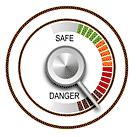 Mbeki's spokesman Mukoni Ratshitanga told The Times: "They briefed the President on the nature of the problem, its extent and what it is they want to do to ameliorate the situation."
Mbeki's spokesman Mukoni Ratshitanga told The Times: "They briefed the President on the nature of the problem, its extent and what it is they want to do to ameliorate the situation."As domestic supply reached its limit this weekend, South Africa suffered crippling backouts and electricity exports to neighbouring Botswana and Zimbabwe were stopped. This led to a wider grid failure affecting Zambia, further to the north, while in Zimbabwe it was 24 hours before power returned.
Eskom, South Africa's nationally-owned electricity utility, is currently managing surging demand with 'load shedding' which means power is switched off for some areas two or three times each day. Today, an indicator on the company's website rates the supply situation as close to the 'danger' level with a shortfall of 2500 MWe.
This has been the situation over recent years, since it became clear that planning for the period after 1994's political changes had been inadequate. Growth in demand for power began to outstrip supply, while a national project to connect more communities embarked on connecting some 300,000 households per year to the grid.
| Railway power failure sparks unrest Separate to Eskom's problems, an unrelated power failure whichparalysed commuter trains for over two hours led to commuters setting fire to trains. The Times reported that six engines and 18 carriages were destroyed in Pretoria on 19 January while track was damaged in the arson that will cost R152.5 million ($21.17 million) to repair. Two train routes used by 40-50,000 people per day could be closed for up to six months. |
However, Eskom has faced criticism recently for failing to keep to load shedding schedules. This has made it hard for businesses to plan their operations and could begin to seriously affect the economy.
A Business Report article listed a number of companies engaged in South Africa's metal mining and refining industries, some of whom feared plans to expand operations in coming years could be scuppered by lack of power supply. Each operator must secure power supply agreements from Eskom for expansions, some of which amount to hundreds of megawatts over the next decade.
On 22 January Eskom announced it would raise power prices by 14.2% in the financial year 2008-9, saying this would address increases in the cost of coal and power plant equipment. costs. These have increased by 30% and 20-50% repectively, Eskom said.
The company had applied to regulators to increase prices by 18.7%, but this was declined. Eskom's finance director, Bongani Nqwababa, warned that power prices were unsustainable even under even the 14.2% increase and steeper rises were required in the near future.
More nuclear power a long-term goal
South Africa is a large country with considerable coal reserves in its north. However, it would be as uneconomic to transport coal to southern power plants as it would be to transmit electricity that distance. The country has developed an ambitious plan to expand its use of nuclear power, particularly in the southern Cape region, where the two-unit Koeberg plant already generates 1842 MWe.
According to the Nuclear Energy Corporation of South Africa (Necsa) some 12 full size 1000 MWe reactors could be in operation by 2030, along with 24 indigenously designed pebble bed units. The PBMR Pty company is developing the 165 MWe Pebble Bed Modular Reactor and hopes it could be deployed widely for localised electricity generation and industrial heat-supply applications.
Eskom is rumoured to be close to picking a supplier for up to 3300 MWe of nuclear capacity. Developments are expected within months.




_47120.jpg)

_23621.jpg)






